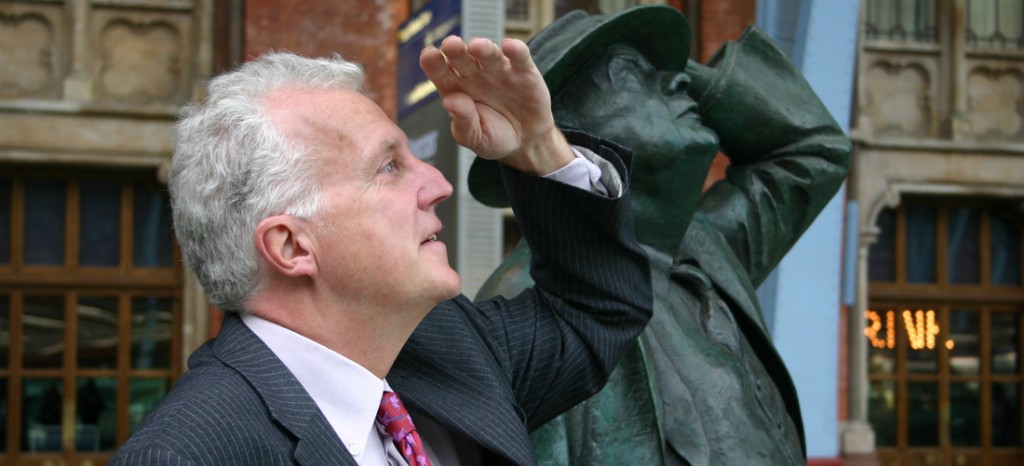The Mayor’s announcements of a set of cycling superhighways and the £25 congestion charge for ‘gas guzzlers’ have, at last, brought transport to the fore in the mayoral hustings.
Yet, even with these announcements I suspect that transport will feature less as a factor in determining people’s votes than many other considerations, not least the basic one of how Labour and the Tories are performing in the national opinion polls.
So far there has been little differentiation on transport and what has emerged is thin gruel. Boris Johnson says we must have more police on buses and that there needs to be more investment. Brian Paddick for the Lib-Dems has a 10- point plan for improving the taxi service and suggests the Tube lines maintained by the failed contractor Metronet should be handed over to private-sector franchises. As for Ken Livingstone, it is largely more of the same: better buses, more Oyster cards and more control by taking over more of national rail services to become part of the London Overground.
There is much consensus, too much. All three candidates want more efficient trains and buses. They all support Crossrail and would retain the congestion charge, although Paddick would scrap the western extension and Johnson is against Livingstone’s plan of charging extra for gas- guzzlers.
It is too early to analyse precisely the implications of Livingstone’s cycling highways – are they just glorified and slightly improved cycle routes, or something really radical? – but so far none of the parties have been prepared to challenge the central belief that everyone has the right to drive anywhere at any time without regard for the consequences.
Cities like Amsterdam, Berlin and Copenhagen have for years had radical plans to squeeze cars out of the central areas – and even the suburban centres – by favouring public transport and cycling and walking. To make this election interesting, Livingstone needs to try to define himself in the same way. It’s not a matter of being anti-car, its about being pro the alternatives.
The congestion charge and the part pedestrianisation of Trafalgar Square represented a good start, but somehow the momentum has been lost. It took 30 years for Leicester Square to be pedestrianised, but no one would think of reopening it now to traffic. Yet, after eight years of Livingstone, we still have a major shopping street that is clogged with motorised traffic while millions of pedestrians are forced onto narrow pavements.
It would be much more interesting if a real ideological divide emerged on transport which should be the central part of the debate between the two sides. After all, the mayor has more control on transport issues than virtually anything else. Transport for London is a massive organisation with a huge budget and virtually every Londoner interfaces with some aspect of its work every day.
t is not as if there were any lack of major transport issues. The roads are heading back to pre-congestion charge levels of gridlock, the tubes are overcrowded, the bus service, albeit improved, is costing millions and sports the deeply unpopular bendy buses (called Hendy buses amongst opponents, as their number one supporter is the Transport Commissioner Peter Hendy) and the collapse of Metronet’s PPP contract poses very fundamental questions about how services should be delivered.
Somehow, though, transport never quite gets to the front of the politicians’ agenda, even in London where the issue looms particularly large as public transport is so important. This is an oddity that I have never quite understood. Whereas most people have a view on transport and suffer from the inadequacies of the system so often, transport rarely figures as a major political issue.
One problem is that there is not a sufficiently clear divide on the issue. Sure, in the old days the Conservatives would be more likely to support roadbuilding, while Labour was seen as the party of public transport. But in these days of almost universal car ownership, we are all road users as well as pedestrians, and most people, even if they are not public transport passengers themselves, will recognise the value of having a good service, if only to clear the road space for their cars. Therefore, most of us have a vested interest in general improvements to transport and are not sufficiently swayed by the nuances of policy between the two sides.
I remember in the early 1970s, for example, voting for the first time in a GLC election because the Tories wanted to build the motorway rings around London and the proposal got thrown out by the electorate. Yet, today, even Livingstone is spending £500m on a new road bridge across the Thames.
To liven up the debate, we need really radical policies, such as extending the congestion charge to the whole of London and using the proceeds to scrap the council tax, a suggestion made by David Begg of this parish. We could then all enjoy a real ding dong on transport issues with clear blue water between the two sides instead of the rather wishy-washy consensus that is a recipe for a low turnout.
